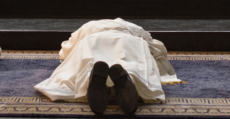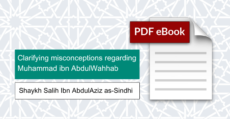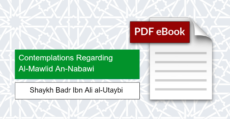In the name of Allaah, the Most Merciful, the Bestower of Mercy.
There are a number of very important questions that any person who is celebrating the birthday of the Prophet (sal Allaahu alayhi wa sallam) should ask themselves:
1. How many times did the Prophet (Sal Allaahu alayhi wa sallam) celebrate his own birthday?
2. In which place did the noble Companions (may Allaah be pleased with them) first celebrate the Prophet’s birthday?
3. What route did the noble Companions (may Allaah be pleased with them) take in their march (jaloos) for the Prophet’s birthday?
4. What type of sweets were distributed and eaten by the Prophet (sal Allaahu alayhi wa sallam) and his noble Companions (may Allaah be pleased with them) on the day of the Prophet’s Birthday?
4. Which poetry and Nasheeds were sung by the Prophet (Sal Allaahu alayhi wa sallam) and his noble Companions during the Milaad?
If you have looked through the books of Hadeeth and you can not find the answers with respect to the Prophet (sal Allaahu alayhi wa sallam) and his companions, then try looking at the history books specific to the era of the Four Rightly Guided Caliphs:
5. How much did Abu Bakr, Umar, Uthman and Ali (may Allah be pleased with them) spend on state decorations for the Mawlid?
6. How many people took part in their marches on the 12th of Rabee’ al-Awwal?
7. For how many days did they declare a public holiday with respect to the Mawlid?
If you can’t find the answers in the era of the Caliphs, then try answering the same questions in the life time of the early Imaams such as Imaam Abu Haneefah, Imaam Shaafi’ee, Imaam Maalik and Imaam Ahmad ibn Hanbal as well as the other pious scholars of the first three generations of Muslims.
8. What is mentioned about Mawlid an-Nabee in the early books of the Hanafi, Maliki, Shaafi’ee and Hanbalee Imaams?
9. In which mosques did these great Imaams hold their ‘mehfils’ and conferences on the night of the Mawlid?
10. What Mawlid instructions did Imaam Abu Haneefah give to his two great students Imaam Abu Yusuf and Imaam Muhammad?
If you can not find the answers at all, then ask yourselves the following questions:
1. If you can’t find a precedent from the Prophet (sal Allaahu alayhi wa sallam), the wives of the Prophet, the rightly guided Caliphs, the noble companions, the early Imaams – in fact nobody from the first three generation of Muslims, then where did you get this action from?
2. Why do you do something with the intention of loving the Prophet (Sal Allaahi alayhi wa sallam) and yet those who loved him the most never did?
3. Why do you blame the people who leave off this action that the Prophet (Sal Allaahu alayhi wa sallam) himself, his Companions and the great Imaams of the early generations also left off?
After answering these questions, answer one more question:
What is the only way to actualise and demonstrate true love and devotion to the Prophet (Sal Allaahi alayhi wa sallam)?
* Hint:
You will find the answer in the following Aayah:
{Say if you truly love Allaah, then follow me [Muhammad] and Allaah will love you and forgive your sins. Indeed Allaah is Most Forgiving and Most Merciful.} [03:31]
al-Haafidh Ibn Katheer (rahimahullah) said,
This honorable Aayah judges against those who claim to love Allaah, yet do not follow the way of Muhammad (sal Allaahu alayhi wa sallam). Such people are not true in their claim until they follow the Law of Muhammad (sal Allaahu alayhi wa sallam) and his religion in all his statements, actions and conditions. [1]
We ask Allaah to guide us to His love and the love of His Messenger, we ask Allaah to save us and the Muslims from all forms of innovation,.
May peace and blessings be upon His Messenger Muhammad, his family, companions and followers.
Written by the one in need of Allaah:
Abul Abbaas Naveed Ayaaz
Nelson, Lancashire, UK
6th Rabee’ al-Awwal, 1436h
28th December, 2014
Footnotes
[1] Tafseer Ibn Katheer, Soorah Aal Imraan, Aayah: 31-33




that is good my brother
their many people that cleabrearion of the barth of prophet (pbuh).
jazakallahu kairin my brother to tell the true
Baarakallah feekum